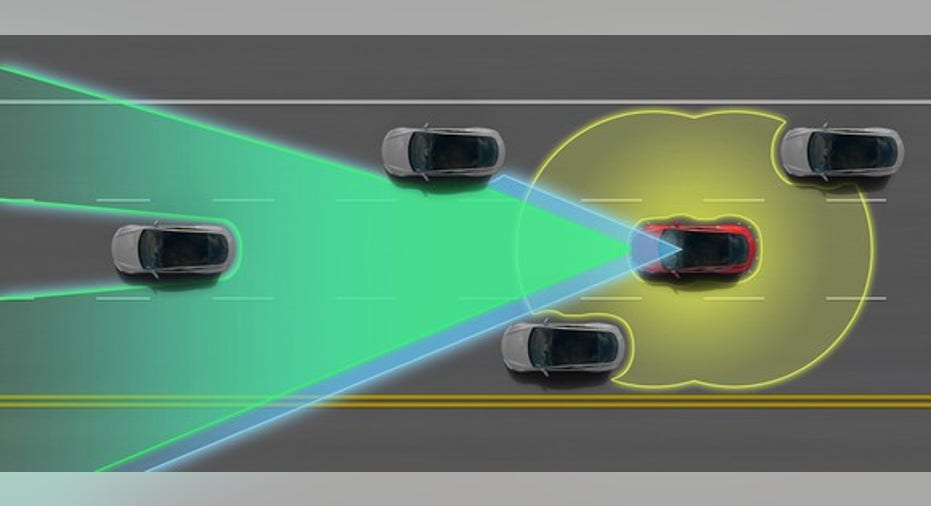Tesla Motors, Inc. Confirms NHTSA's Preliminary Evaluation of Autopilot

It was basically inevitable. At some point, the safety of electric-car maker Tesla Motors' Autopilot, or its traffic-aware cruise control, automatic steering, and accident avoidance systems, would face scrutiny after an accident. On the heels of a tragic fatal accident in a Model S that occurred while Autopilot was engaged, the National Highway Traffic Safety Administration opened a preliminary evaluation into Autopilot's performance.
Model S with Autopilot engaged. Image source: Tesla Motors.
The incident
Informing investors of the situation, Tesla explained the incident in great detail on Thursday in a blog post.
Tesla "informed NHTSA about the incident immediately after it occurred," the company said.It's worth emphasizing that NHTSA's "preliminary evaluation" is the agency's lowest form of formal investigatory work.
Should investors be concerned?
At this point, overall information seems to suggest Tesla will fair just fine in this investigation. Here are several reasons why.
First, the fatality rate while Autopilot is engaged is significantly lower than the fatality rate for all U.S. vehicles. Tesla asserts this is the "first known fatality" in over 130 million miles driven with Autopilot engaged. This contrasts with "a fatality every 94 million miles" for all driving in the U.S., Tesla explains.
Second, Tesla still explicitly refers to Autopilot as "an assist feature that requires you to keep your hands on the steering wheel at all times." To reinforce this statement, Autopilot technology will deactivate by gradually slowing the car to a stop if it doesn't regularly detect hands on the wheel. Further, every time Autopilot is activated, it reminds the driver to "always keep your hands on the wheel. Be prepared to take over at any time."
Finally, Tesla still disables Autopilot by default, requiring the owner to explicitly acknowledge that the system is still in a public beta phase.
It's difficult to argue with hard data
If the fatality happened at an earlier date, and before Tesla had accumulated this many miles with Autopilot activated, this could have been a huge setback for the company. Fortunately, however, with only one fatality in 130 million miles of Autopilot's public beta, Tesla's data could soon begin to paint a convincing case that the feature enhances safety.
Tesla Autopilot. Image source: Tesla Motors.
Indeed, earlier this year, Tesla already cited some impressive data about how Autopilot enhances safety.
"And when we look at the data -- this is a really interesting fact -- of cars that if Autopilot is turned on or off," Tesla CEO Elon Musk explained at a conference in Norway in April, "the probability of having an accident is 50% lower if you have Autopilot on -- even with our first version."
Longer term, Tesla plans to build completely autonomous vehicles. But it's going to require some very convincing data. To make progress in this direction, Musk has said on several occasions that Tesla realizes that it's going to be important for the company to be able to statistically articulate, with a large amount of data, that the safety level with automatic driving technologies engaged is significantly higher than non-autonomous driving.
This tragedy itself is terrible news. The first fatality, however, does highlight how Tesla is beginning to build a case for the increased safety associated with its Autopilot technology. However, the company will likely need fatality rates to be even lower for it to eventually convince regulators to begin trusting more-comprehensive driver-assist systems.
While available information may suggest Tesla will likely come out of the investigation without any significant troubles, investors should still definitely keep an eye out for any updates.
The article Tesla Motors, Inc. Confirms NHTSA's Preliminary Evaluation of Autopilot originally appeared on Fool.com.
Daniel Sparks owns shares of Tesla Motors. The Motley Fool owns shares of and recommends Tesla Motors. Try any of our Foolish newsletter services free for 30 days. We Fools may not all hold the same opinions, but we all believe that considering a diverse range of insights makes us better investors. The Motley Fool has a disclosure policy.
Copyright 1995 - 2016 The Motley Fool, LLC. All rights reserved. The Motley Fool has a disclosure policy.



















